|
|
|
Sort Order |
|
|
|
Items / Page
|
|
|
|
|
|
|
| Srl | Item |
| 1 |
ID:
157677
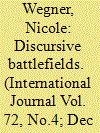

|
|
|
|
|
| Summary/Abstract |
Winning hearts and minds in counterinsurgency missions is not only a strategy to be used on foreign populations, but also one that is necessary on the “home front.” This article is focused on the home battlefield; it is an analysis of the efforts by Canadian political elites to justify the use of military resources during the 2001–2011 interventions in Afghanistan. To fully understand Canadian public opinion of the Afghanistan war requires assessing domestic discursive “battlefields.” This article examines domestic debates as a key “battleground” in the war to win public consent for Afghanistan. I argue that the absence of active resistance to military involvement in the Afghan mission can best be explained by examining discourse about Support(ing) the Troops, the effect of which was to censure anti-war voices. In short, despite public discontent about the war, Support the Troops discourse was manoeuvred in a way that stigmatized anti-war narratives. This article considers how the rhetoric of Support the Troops movements in Canada played a role in normalizing militarization, and how this discourse was manoeuvred to legitimize military activities in Afghanistan.
|
|
|
|
|
|
|
|
|
|
|
|
|
|
|
|
| 2 |
ID:
157681
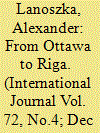

|
|
|
|
|
| Summary/Abstract |
In June 2016, Canada joined the United States, Great Britain, and Germany in becoming a Framework Nation that leads a multinational battalion-sized battlegroup in Latvia. Canada thus appears to be reprising the role it played during the Cold War as a leading participant in North Atlantic Treaty Organization deterrence and reassurance initiatives in Europe. Yet the three tensions that made Canada reduce its military commitments to allies over the course of the Cold War might resurface in the Baltic region. These three tensions relate to conventional specialization amid alliance nuclearization, low defence spending despite that specialization, and the potential decoupling of Canadian security interests from those of its European partners. Canada might find itself lacking the willingness and ability to sustain the tasks attending the Latvia deployment if the threat environment intensifies.
|
|
|
|
|
|
|
|
|
|
|
|
|
|
|
|
| 3 |
ID:
157679
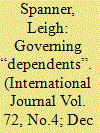

|
|
|
|
|
| Summary/Abstract |
Pioneering feminist International Relations scholarship suggests that in order to function, militaries rely on spouses, most often wives, to undertake the majority of domestic labour, suspend their own careers, and relocate willingly for new postings. However, the contemporary military family’s relationship to war making may be different because family forms are changing: norms around domestic responsibilities and primary earners suggest greater gender equality, and women are contributing to war making as soldiers. Thus, this paper asks whether the military’s reliance on the traditional family, and conventional gender relations, is being reinforced or destabilized by policies and programs that speak to Canadian military families. A critical feminist policy analysis of select policy and program documents, which address unique and characteristics of military life (mobility and separation) is undertaken. While there is discursive acknowledgment of the changing composition of military families, traditional familial and gendered assumptions persist in subtle ways.
|
|
|
|
|
|
|
|
|
|
|
|
|
|
|
|
| 4 |
ID:
157683
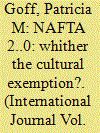

|
|
|
|
|
| Summary/Abstract |
The North American Free Trade Agreement renegotiation has created uncertainty around a number of provisions, including the cultural exemption. I argue that Canadian government advocacy of a cultural exemption will take place in a new context due to the approaches they have favoured in recent trade agreement negotiations, and to economic shifts driven by digital technologies.
|
|
|
|
|
|
|
|
|
|
|
|
|
|
|
|
| 5 |
ID:
157680
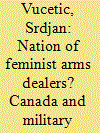

|
|
|
|
|
| Summary/Abstract |
The Canada-Saudi light armoured vehicles deal is likely to be remembered as the Trudeau government’s first scandal. Situating this deal in a historical-comparative context and using the best available quantitative arms trade data, this analysis advances two main claims. First, Canada’s Liberal governments are just as likely as Conservative governments to encourage exports of Canadian military goods, including goods going to human rights-abusing customers. Second, Canada’s overall arms exporting behaviour is similar to the behaviour of its “international do-gooder” peers, Sweden and the Netherlands. How Canadian governments will respond to the ever-increasing international demands for accountability in this area remains to be seen.
|
|
|
|
|
|
|
|
|
|
|
|
|
|
|
|
| 6 |
ID:
157684
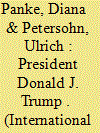

|
|
|
|
|
| Summary/Abstract |
Since his inauguration, US President Donald Trump has made news by violating international and domestic norms, such as norms of diplomatic communication or the non-discrimination norm. This paper uses theoretical approaches to norm eradication in order to examine whether President Trump has turned into an effective agent of norm death leading to the abolition of domestic and international standards of appropriateness. It discusses how the precision of the respective norms, the stability of their contexts, and the actions of norm proponents have played out. This reveals that President Trump’s actions have so far lacked effectiveness, and have not led to norm death. The longevity of challenged norms cannot be taken for granted, however—especially if the challenger is a powerful actor. In order to avoid norm death under this circumstance, it is essential that norm proponents possess capacities and competencies to act, and employ them to defend challenged norms.
|
|
|
|
|
|
|
|
|
|
|
|
|
|
|
|
| 7 |
ID:
157682
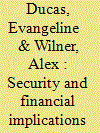

|
|
|
|
|
| Summary/Abstract |
Driven by advances in data analytics, machine learning, and smart devices, financial technology is changing the way Canadians interact with the financial sector. The evolving landscape is further influenced by cryptocurrencies: non-fiat, decentralized digital payment systems, like Bitcoin, that operate outside the formal financial sector. While Bitcoin has garnered attention for facilitating criminal activity, including money laundering, terrorism financing, digital ransomware, weapons trafficking, and tax evasion, it is Bitcoin's underlying protocol, the blockchain, that represents an innovation capable of transforming financial services and challenging existing security, financial, and public safety regulations and policies. Canada's challenge is to find the right balance between oversight and innovation. Our paper examines these competing interests: we provide an overview of blockchain technologies, illustrate their potential in Canada and abroad, and examine the government's role in fostering innovation while concurrently bolstering regulations, maintaining public safety, and securing the integrity of financial systems.
|
|
|
|
|
|
|
|
|
|
|
|
|
|
|
|
| 8 |
ID:
157678


|
|
|
|
|
| Summary/Abstract |
The militarization of Canadian society since 9/11 has attracted considerable academic attention. What has largely escaped notice is the simultaneous process of remilitarization undergone by the Canadian Armed Forces, in which a more aggressive “warrior” posture has encouraged the development of male-only special forces units, further exacerbating the existing gendered combat/noncombat binary. This article explores this process, arguing that the state of exception created by the Global War on Terror has allowed the de facto exclusion of women from the Canadian Armed Forces’ most highly valued roles, even as the military continues to assert its gender neutrality and progressive, integrated force structure.
|
|
|
|
|
|
|
|
|
|
|
|
|
|
|
|
|
|
|
|
|